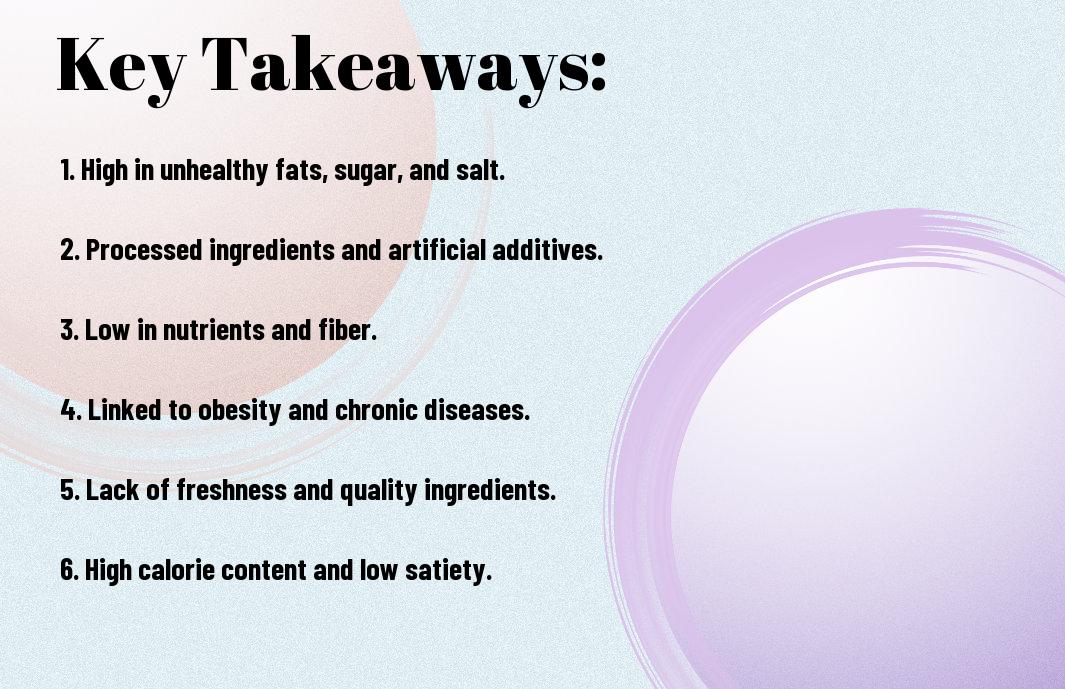With fast-paced lifestyles and convenience at the forefront, it’s easy to see why fast food has become a staple in your diet. However, have you ever stopped to think about why it’s often referred to as “junk food”? Let’s probe into the reasons behind why fast food may not be the healthiest option for your body and well-being.
Key Takeaways:
- High in unhealthy ingredients: Fast food is often high in added sugars, saturated fats, and sodium, which can contribute to various health problems.
- Lack of nutrients: Many fast food items lack crucial nutrients like vitamins, minerals, and fiber, leading to an unbalanced diet.
- Highly processed: Fast food is heavily processed, which can strip away natural nutrients and lead to poor nutritional value in the final product.
The Definition of Junk Food
Your indulgence in fast food comes with the baggage of consuming what is commonly known as junk food. But what exactly classifies a meal as junk food? Let’s probe into the definition of this culinary culprit.
Nutritional Value
Nutritional value plays a pivotal role in categorizing food as junk. Fast food lacks necessary nutrients like vitamins, minerals, and fiber, while being high in unhealthy fats, sugar, and salt. This imbalance can lead to various health issues in the long run if consumed frequently.
Ingredients and Additives
Any food item laden with artificial ingredients, preservatives, and additives usually falls under the junk food category. These substances are added to enhance flavor, texture, and shelf life but offer little to no nutritional benefit. Excessive consumption of such additives has been linked to adverse health effects.
For instance, many fast food items contain high fructose corn syrup, artificial flavors, and colors, which not only lack nutritional value but may also have negative impacts on your health when consumed in excess. Being mindful of these additives can help you make healthier choices when it comes to food selection.
The Rise of Fast Food Industry
Historical Background
Fast food as we know it today has its roots in the post-World War II era. In the 1950s, the fast food industry started to boom in America with the growth of franchised restaurants like McDonald’s, Burger King, and KFC. These restaurants offered quick, convenient, and affordable meals that catered to the busy lifestyles of Americans.
Marketing Strategies
Industry giants like McDonald’s revolutionized the way food was marketed to the masses. Their clever advertising campaigns targeted children and families, creating a culture of convenience and indulgence around fast food. Through slogans, mascots, and toy giveaways, fast food companies ingrained themselves into popular culture, making their products appealing and irresistible.
To further entice consumers, fast food chains strategically placed their restaurants near schools, workplaces, and busy intersections. The convenience of grabbing a quick meal on the go became a norm, shaping eating habits and preferences for generations to come.
The Unhealthy Truth About Fast Food
High Calorie and Fat Content
Many fast food options are loaded with high calories and unhealthy fats, making them a significant contributor to weight gain and obesity. These foods are often deep-fried or processed with added oils and sugars, increasing their caloric content and negating any nutritional value they may have had.
Low in Essential Nutrients
Fast food is typically low in imperative nutrients such as vitamins, minerals, and fiber. When you consume fast food regularly, you may be missing out on the vital nutrients your body needs to function properly. This can lead to deficiencies and overall poor health over time.
Another issue with fast food is its lack of diversity in terms of food groups. Most fast food items revolve around simple carbs, unhealthy fats, and protein sources that are often laden with preservatives and additives. This imbalance in nutrients can have long-term consequences on your health.
Link to Chronic Diseases
Essential research has shown a strong link between frequent fast food consumption and the development of chronic diseases such as heart disease, diabetes, and obesity. The high levels of saturated fats, trans fats, and sodium in fast food can wreak havoc on your cardiovascular system and metabolism, leading to serious health conditions.
This highlights the importance of being mindful of your fast food intake and opting for healthier, balanced meal options whenever possible. Making small changes in your eating habits can have a significant impact on your long-term health and well-being.

The Impact on Public Health
Obesity Epidemic
Keep in mind that fast food is a major contributor to the obesity epidemic that is sweeping the nation. When you regularly consume fast food, you are loading your body with high levels of unhealthy fats, sugars, and calories. These meals often lack vital nutrients and fiber, leading to overeating and weight gain.
Increased Risk of Diabetes and Heart Disease
Epidemic
Fast food consumption has been linked to an increased risk of developing serious health conditions such as diabetes and heart disease. The excessive intake of processed sugars and unhealthy fats in fast food can lead to insulin resistance, weight gain, and ultimately, type 2 diabetes. Additionally, the high levels of sodium in fast food can contribute to hypertension and cardiovascular diseases.
A
Moreover, the harmful trans fats found in many fast food items can raise bad cholesterol levels in your body, further increasing the risk of heart disease. It’s vital to be mindful of these health risks and consider healthier food options to protect your well-being in the long run.
Effects on Mental Health
Any
It’s crucial to note that your food choices can also impact your mental health. Studies have shown that a diet high in fast food and processed foods may increase the risk of mental health disorders such as depression and anxiety. The lack of vital nutrients in fast food can affect brain function and mood regulation, potentially leading to negative mental health outcomes.
Public
By being aware of the detrimental effects that fast food can have on your physical and mental well-being, you can make informed choices to prioritize your health. Consider opting for whole, nutrient-rich foods that nourish your body and support overall wellness. Your health is precious, so take the necessary steps to care for it wisely.

The Environmental Cost of Fast Food
Packaging Waste
For every fast-food meal you consume, think about the amount of packaging waste that is generated. From the paper wrappers to the plastic cups and utensils, fast food is notorious for producing excessive amounts of single-use packaging that typically ends up in landfills or polluting our oceans. By choosing fast food, you are contributing to this environmental burden of packaging waste that takes hundreds of years to decompose.
Resource Depletion
The fast-food industry heavily relies on natural resources for its production processes. Agriculture for meat and crops, water for cooking and processing, and fossil fuels for transportation all play a significant role. The demand for these resources by the fast-food industry can lead to overexploitation and depletion of natural ecosystems. This can result in deforestation, water scarcity, and habitat destruction, impacting biodiversity and the overall health of the planet.
Depletion of natural resources due to the fast-food industry can have far-reaching consequences, affecting not only the environment but also communities that rely on these resources for their livelihoods. By being mindful of your consumption choices and opting for sustainable food options, you can help mitigate the negative effects of resource depletion.
Contribution to Climate Change
With the widespread production and consumption of fast food, the industry significantly contributes to climate change. Livestock farming for meat production releases greenhouse gases like methane and carbon dioxide, while the transportation of ingredients and finished products adds to the carbon footprint. These practices exacerbate global warming and environmental degradation.
For instance, deforestation for cattle ranching to meet the demand for fast-food burgers not only leads to habitat loss but also releases stored carbon into the atmosphere, further intensifying the effects of climate change. By reducing your intake of fast food and choosing more sustainable food options, you can play a part in mitigating the harmful impact of the fast-food industry on our planet’s climate.
The Social and Economic Consequences
Exploitation of Workers
All too often, fast food chains exploit their workers to keep costs low and profits high. As an individual who enjoys quick meals at these establishments, you may not realize the harsh realities faced by the workers behind the scenes. Many employees in fast food restaurants are paid minimum wage or even less, forced to work long hours without proper breaks or compensation. This exploitation of workers not only impacts their quality of life but also contributes to wider economic inequalities.
Unfair Business Practices
For fast food giants, unfair business practices are all too common. From dodging taxes to underpaying suppliers, these corporations prioritize profit margins over ethical considerations. This means that while you might be enjoying a cheap meal, there are systemic issues at play that perpetuate exploitation and inequality within the industry.
To add to the issue of unfair business practices, fast food chains often engage in aggressive marketing tactics that target vulnerable populations, such as children and low-income communities. By promoting unhealthy food choices through enticing advertisements and promotions, they contribute to the rising rates of obesity and other health problems in these communities.
Impact on Local Communities
Social and economic consequences of fast food extend beyond worker exploitation and unfair business practices. The establishment of these chains in local communities can lead to a decline in small businesses, loss of cultural diversity, and even negative health outcomes. By dominating the market and offering cheap, unhealthy options, fast food outlets can displace local eateries and contribute to the homogenization of food choices.
With the shift towards fast food consumption, communities lose out on the social aspects of dining and supporting local businesses. This not only affects the economic sustainability of the community but also diminishes the sense of connection and belonging that comes from shared meals and local culinary traditions. As you grab a quick meal from a fast food chain, consider the broader implications it has on the fabric of your community.

Summing up
To wrap up, fast food is considered junk food due to its high levels of unhealthy fats, sugars, and sodium. Consuming fast food frequently can lead to various health problems such as obesity, heart disease, and diabetes. Additionally, the lack of important nutrients in fast food can leave you feeling unsatisfied and craving more unhealthy options. It is important to be mindful of your fast food consumption and prioritize fresh, whole foods to maintain a balanced and healthy diet.
Q: Why is fast food considered junk food?
A: Fast food is considered junk food because it is typically high in calories, unhealthy fats, and added sugars. It tends to be low in nutrients like fiber, vitamins, and minerals. Consuming too much fast food can contribute to weight gain, obesity, and various health problems.
Q: How does frequent consumption of fast food affect health?
A: Frequent consumption of fast food can have negative effects on health. It can lead to an increased risk of obesity, heart disease, type 2 diabetes, and other chronic conditions. Fast food is often high in sodium, which can contribute to high blood pressure and an increased risk of stroke.
Q: What are some healthier alternatives to fast food?
A: Some healthier alternatives to fast food include preparing meals at home using fresh ingredients, opting for whole foods like fruits, vegetables, lean proteins, and whole grains. In addition, choosing restaurants that offer healthier options like salads, grilled proteins, and whole grain options can help reduce the consumption of unhealthy fast food.



